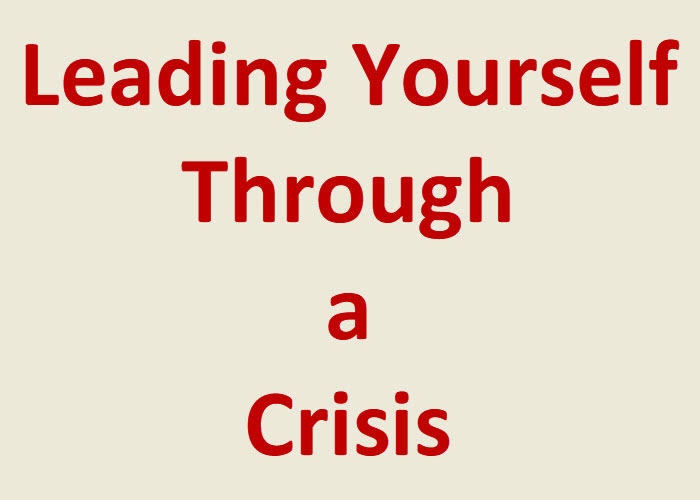Through a long and dismal year, the development of Covid-19 and its devastation and disruption was significant. It is undeniable that everyone is affected by this crisis. Individuals face demands and stresses that can be challenges to their everyday life and/or hindrances to their work. Senior management teams that have to orchestrate contingency and continuity plans, middle managers that have to achieve results inside their teams, employees that had to be efficient in different circumstances, fathers that have to make their children follow their normal routine and not lose their childhood, a housewife that had to perform their everyday housework with all the family members working from home and further more.
What does a crisis mean? Violent change of status quo, complexity, inconsistency and uncertainty combined with fear for the unpredictable future. Covid-19 pandemic was a situation that affected everyone. A pandemic is a type of crisis with specific characteristics. Not only are the economic aspect of living and day to day way of working are affected but also the majority of human interactions both at companies strict territories and societal level. Contagious disease outbreaks are likely to trigger not only fear of the other (infected individuals) but also generates epistemic anxiety that becomes incorporated into the culture of every community, a company, a country or the word in whole.

However some persons cope with this situation differently from others. They seem to handle their feelings in order not to be paralyzed by them and to effectively respond to the crisis remaining focused on their long term goals, to secure their dreams and vision and at the same time they do face reality with realistic optimism. These individuals are generally characterized by high levels of personal resilence and are able to cope with difficult situations and don’t lose their momentum. They are affected lesser by constraints of the external and stay “loyal” to their aspirations and dreams.
The concept of resilience is closely connected with the concept of self-leadership as exercising and improving yourself towards being able to lead yourself can help you being able to return
In the face of a crisis some people ride out uncertainty instead of being overpowered by it. Are there special personal characteristics of these persons? Are they gifted from their birth having supreme quality of genes? Maybe but what they do is exercising certain behaviors. Behaviors that not only triggered by their personal characteristics and their personality but from their willingness and commitment in those behaviors
Many terms are developed by the academics that shed light in the umbrella term of Self-Leadership. Let’s try to shed light to some aspects of self-leadership via behaviors that can help an individual effectively respond to a crisis.
Positive Self-Talk
Self-talk can be really insightful in any kind of situations. It’s an inner dialogue you make with yourself in order to reveal your actual (subconscious many time and automatically triggered) thoughts, beliefs, questions, and ideas. Plenty of negative thoughts and deeply established pattern of thinking prevent us from exploiting all our potential and to take action. During the pandemic some extremely stressful and negative thoughts that often lead to paralysis can be modified with positive thinking patterns. Identifying the negative feelings that are triggered by thoughts is a trigger for a self – talk initiation to found how value, helpful and effective are the thoughts you are making or if any alteration is required. Devoting a certain period of time the end of day for reviewing your behaviors, thoughts and feelings may also help.
Self-Control
Managing your emotions, behaviors and interactions with people and situations is very important during crisis situations where is easy to let yourself being adrift. Picking the most useful and constructive reactions to external stimulus and avoiding negative temptations and impulses can contribute to high levels of personal effectiveness. The deviation from the status quo, the normal and an embraced routine may trigger impulses and self – destructive behavior. Self-control can be both learned and strengthened and be an antidote to the natural reactions to a crisis.
Self-Motivation
Challenges from working from home during Covid-19 crisis including the lack of motivation. Motivation is intrinsic and extrinsic . New working conditions can have a significant reduce of external motivation factors and so focusing on intrinsic motivation is a key for one’s effectiveness. Giving rewards to yourself, find the opportunity and the creative element in every task you have to complete and remembering your long term goals, your raison d être and your vision may help an individual to increase his self-motivation.
To be clear the interest and the enjoyment of a task is a matter of the task itself and the purpose you are perceiving it has. However still you can search for aspect of the job that make it interesting and valuable in order to bridge the gap between the ideal job and the actual job you are called to do. Focused on goal attainment (self-cueing), and setting challenging and specific goals (self-goal setting) enable employees to successfully accomplish work tasks even when they are unpleasant (Neck & Houghton, 2006)[2].
Self-development
Having a certain development plan is sometime difficult in during a crisis. As the emerge needs and the priorities are differentiated self-development may be not a priority and conceived as a luxury. Continuous learning is a frame of mind and a set of behaviors that contribute to ongoing professional renewal and creation of opportunities. Trying to maintain your self-development and self-learning goals during a crisis (that may be last for long time) is a way to productively turn your negative attitudes and behaviors triggered by the crisis to more productive one. Trying to “cure” inflated ego and being receptive to new ideas can contribute to self-enabled learning. Especially during crises leaders has to empower themselves and their people to engage in self-development.
Although changing is better to be done before it is needed a crisis may an opportunity to highlight high appreciated behaviors that need to incorporated into organizational processes, systems, culture etc. Effective and resilient organizations are characterized by collective and individuals behaviors exhibited.
In a nutshell a crisis can contribute to the trigger of new indicative for the case behaviors. And those behaviors can trigger collective and structured approaches derived from top management and transmitted to the whole organization (organizational practices, new standards, new culture and so an organization transformation than may lead to a more resilient and effective organizations).
"Organizations learn only through individuals who learn. Individual learning does not guarantee organizational learning. But without it, no organizational learning occurs." - Peter Senge
 Author: George Sioutzos, Business Analyst, Business Author
Author: George Sioutzos, Business Analyst, Business Author
George Sioutzos is working in the business consulting industry as a business analyst. He has experience in projects from different sectors. He holds a BSc in Management Science and Technology from Athens University of Economics and Business and Msc in International Business & Management. Numerous articles about business and technology issues have been published in most reputable Greek and foreign media.
References/footnotes:
- Gagné, Marylène & Deci, Edward. (2005). Self-Determination Theory and Work Motivation. Journal of Organizational Behavior. 26. 331 - 362. 10.1002/job.322.
- Neck, Christopher & Houghton, Jeffery. (2006). Two decades of self-leadership theory and research: Past developments, present trends, and future possibilities. Journal of Managerial Psychology. 21. 270-295. 10.1108/02683940610663097.